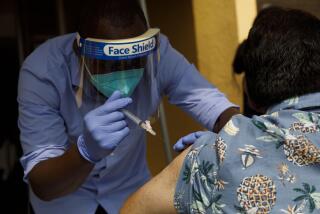Why haven’t you been vaccinated? With COVID-19 raging, people explain what took so long
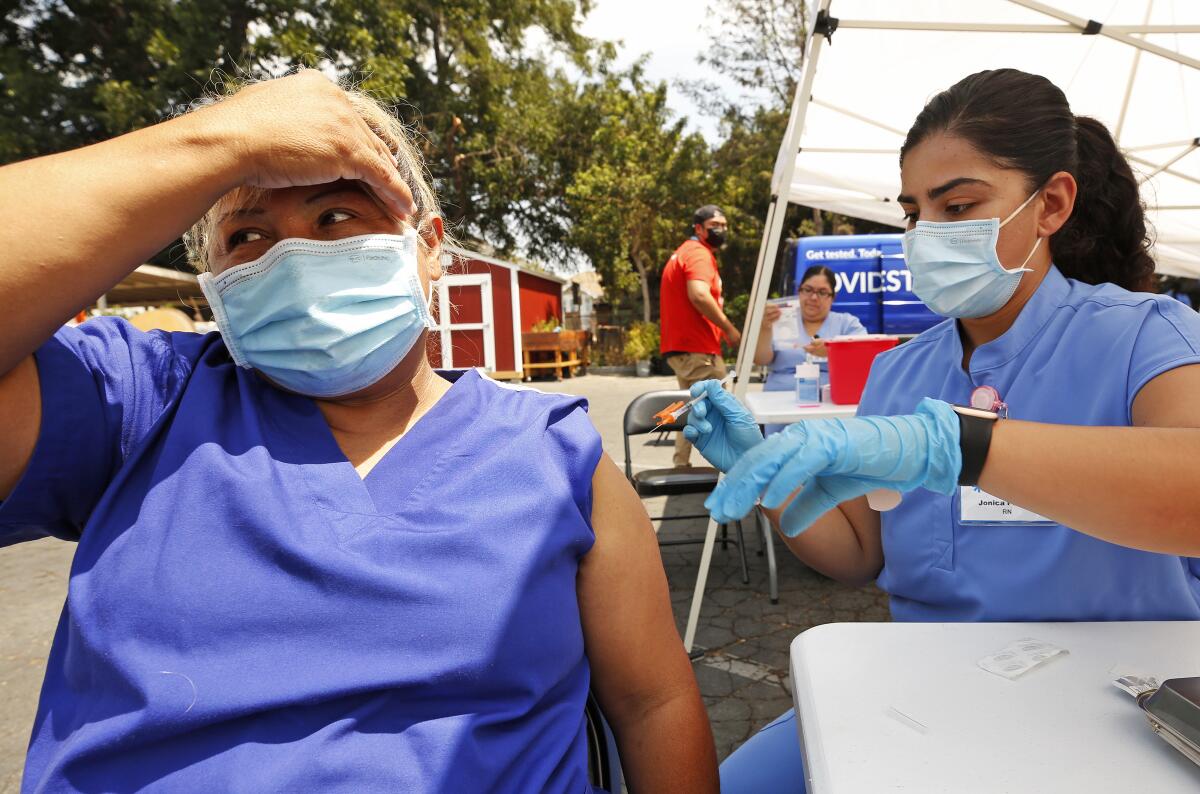
- Share via
Guillermo Cozar waited months to get his vaccine because, he reasoned, he’d already had COVID last fall and didn’t think he would get sick again.
When he showed up at a more-than-a-century-old house of worship in Pico-Union to finally get the shot, there was no more waiting to be done.
There was no line to stand in because few people showed up, even as the Delta variant of the coronavirus causes an increase in infections and hospitalizations across much of the U.S.
“I feel calmer now that I finally got the vaccine,” the 45-year-old said. “I need to protect myself and everyone else.”
Cozar was among more than two dozen people, most of them Latino and immigrant, who showed up at a clinic Friday designed to bring in vaccine stragglers as cases in Los Angeles County reach levels not seen since the waning days of the winter surge.
“With healthy vaccinated people getting sick and unvaccinated people in emergency rooms, now is not the time to ignore the COVID pandemic,” the event flier read.
Nearby, volunteers gave away food as part of a weekly distribution hosted by the Pico Union Project. With the food drawing hundreds of people each week, organizers hoped that it would also attract people who have procrastinated from getting the vaccine.
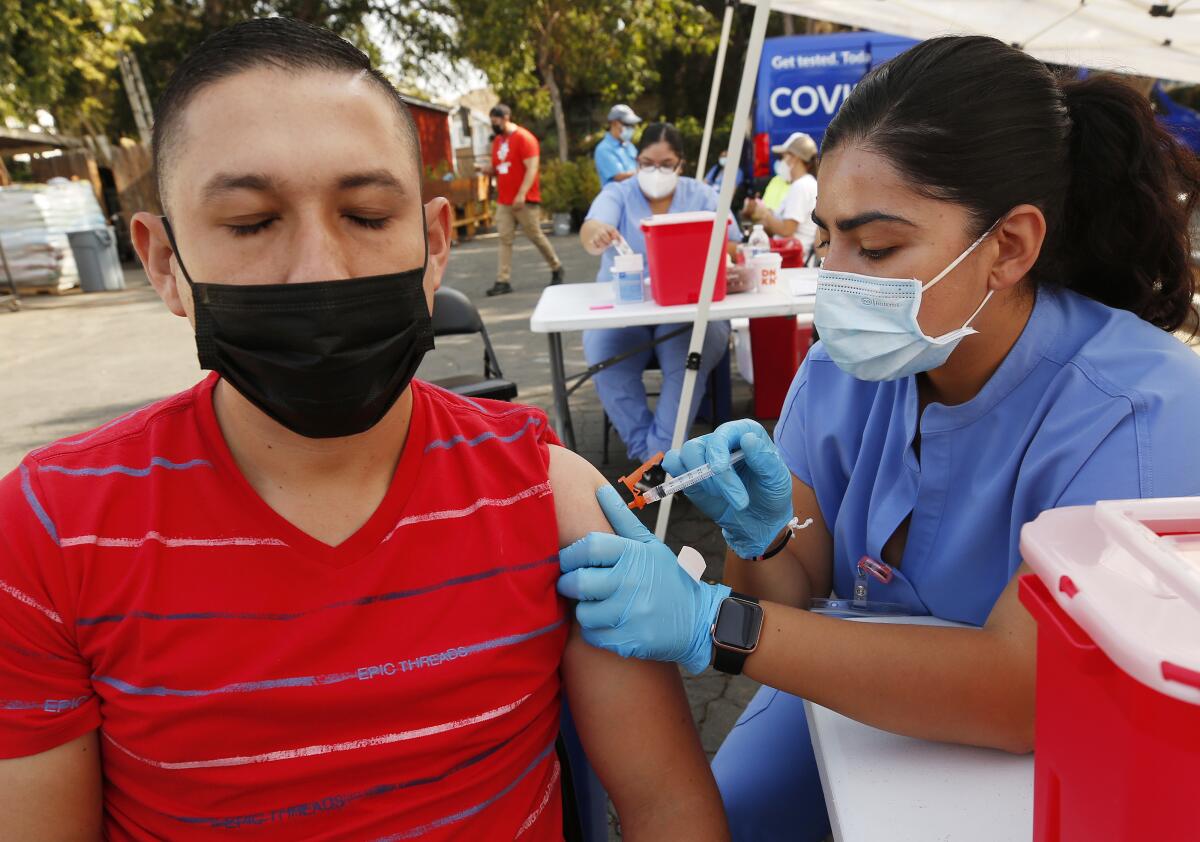
The results were modest. And some of those who showed up to be vaccinated were people from Guatemala, El Salvador and Mexico who felt blessed to get life-saving shots that are so much harder to get it in their countries.
They, too, did not have to wait.
“We’d heard there were a lot of people here who didn’t want to get vaccinated and there was availability, so we thought we’d take advantage since we’d be traveling here,” said David Mendez, who was visiting from Guatemala with his wife and father. “It’s a shame that people have the opportunity to get vaccinated but haven’t done it. Ideally we would all get vaccinated so we could get out of this as quickly as possible.”
On Friday, the county reported 3,058 new coronavirus cases. That means the county has confirmed 10,000 cases just in the last four days.
Hospitalizations are also rising, with the number hitting 655 on Friday.
Between July 12 and 18, just about 57,000 first-dose shots doses were administered across the county. It was an increase of about 2,000 from the previous week.
“We do continue to vaccinate Angelenos at low but steady rates and last week after months, or really after weeks of steadily declining weekly vaccination numbers, we saw an uptick in first-dose recipients,” L.A. County Public Health Director Barbara Ferrer said Thursday.
Although the number of vaccinations is slowly increasing, Latinos still lag behind, with 55% having received at least one dose, compared with 66% of whites. In the Black community, that number stands even lower, at 46%.
“It’s the same communities who have been impacted the most that are still not getting vaccinated,” said Dr. Yelba Castellon-Lopez, an assistant professor with UCLA’s Department of Family Medicine. “It’s a preventable catastrophe.”
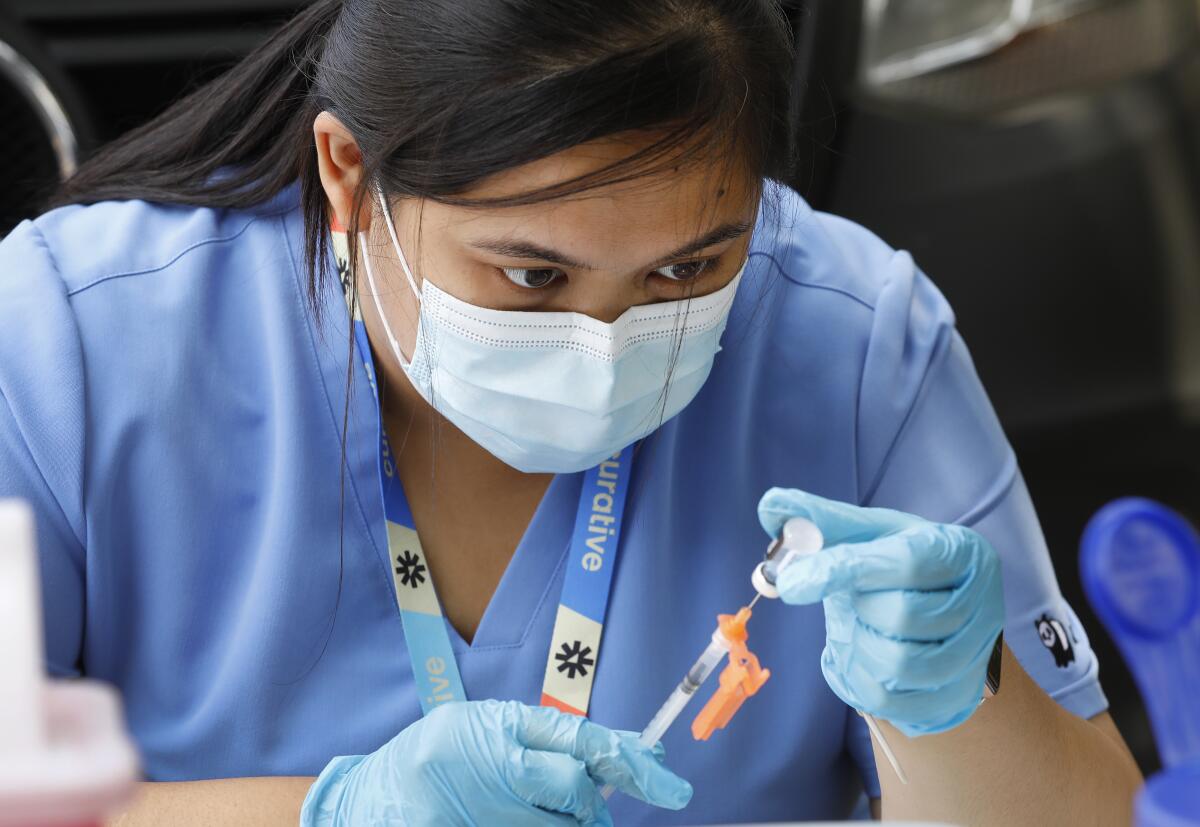
Before 9 a.m., clinic workers set up blue and white tents in the parking lot of the headquarters of the Pico Union Project, a nonprofit that teamed up with Curative health to host the clinic. They planned to administer tests and vaccines over four hours.
Many of those who arrived at the clinic came from outside of Pico-Union, where 60% of residents have received at least one dose.
Around 10 a.m., Marco Figueroa had completed five deliveries for work when he saw the sign he’d been waiting for: “Vacuna de COVID gratis.” Free COVID vaccine.
His sister and brother got vaccinated in May, but the 42-year-old wanted to avoid taking a day off of work.
“Luego, luego,” he would tell his siblings when they asked when he’d go. “Later, later.”
When he spotted the poster board affixed to a utility pole, he decided to give up his lunch hour to get vaccinated. His co-worker parked their work truck in a loading zone on 12th Street and waited as Figueroa headed to the blue tents where two registered nurses were giving vaccines.
As Figueroa waited the 10 minutes for workers to prep the Pfizer vaccine, he gripped the sides of the black folding chair where he sat. Not because he was scared, he said, but because he was worried about falling behind on the deliveries he had left.
As she waited to get vaccinated, Ericka Millan stared skeptically at the needle. She pulled nervously on her pink nails.
“Are you sure it’s Pfizer?” she asked the nurse, who assured her it was. Her family said they had experienced fewer side effects from that vaccine.
The 27-year-old had recently tested positive for an autoimmune disease and worried about what her reaction would be. Because she rarely left home, she delayed getting vaccinated, making her one of the last in her family to get it.
She finally decided to come because she starts teaching at a high school in mid-August and worried about getting exposed to more people. She also cited a growing number of people getting sick at her husband’s work in recent weeks.
“We’re over here anxious about whether they have COVID,” Millan said. “So we were like, might as well get the shot.”
A handful of people who showed up at the clinic, like Cozar, cited the fact that they had gotten COVID during the last surge and felt they had immunity.
Castellon-Lopez said it’s something that’s come up in webinars she’s done with community organizations. She’s also heard from Latinos who worry that the vaccine is too new, who initially worried about the cost and who brought up disinformation around the vaccine.
“I’m able to really spend time and leverage my role as a doctor and trusted source of information to provide people with more information so they feel informed and feel more confident in getting the vaccine,” she said.
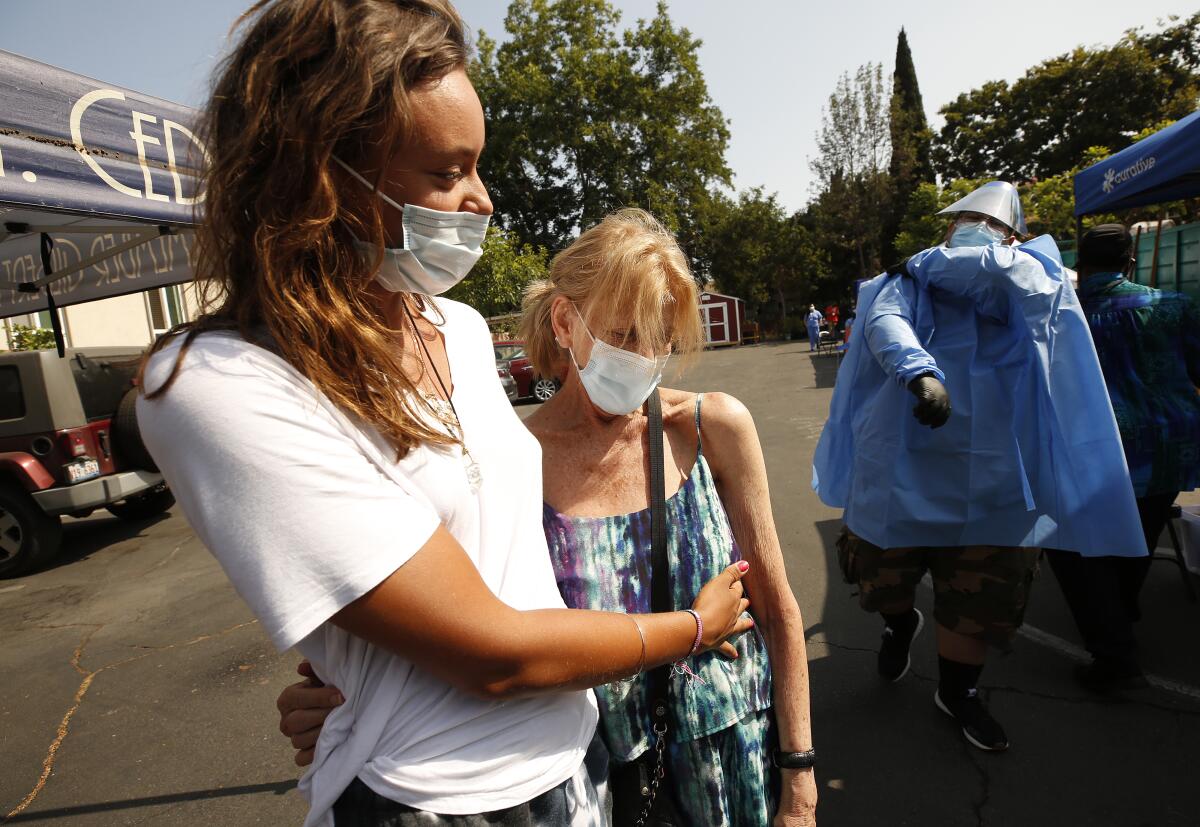
Masha Norman, 19, arrived at the clinic to get her grandmother tested for the coronavirus after an unvaccinated family member tested positive.
Norman and her grandmother were both vaccinated months ago, along with most of her family.
“Why it’s spreading in L.A. County, why we have to wear masks inside again, it’s mainly because of unvaccinated people,” Norman said.
Auxiliadora Gutierrez waited on her twin sister, Socorro Santamaria, to join her at the vaccine clinic. She had held off on getting vaccinated over the last few months, she said, to see how other people reacted to it.
Gutierrez said she had recently watched a man on Spanish-language TV talk about how he had waited and finally decided to get vaccinated, but got sick before he could get his shot.
“He said ‘vaccinate yourselves, don’t keep thinking about it,’” Gutierrez said. “That motivated me. I didn’t want to keep thinking about it.”
Santamaria filled a black pushcart with produce and a box of rice before getting vaccinated. The 55-year-old had heard mixed messages about the vaccines and decided to delay, but the rising COVID cases in the county, along with counsel from the pastors at her church, persuaded her to come.
Gutierrez’s sons have been vaccinated but her daughter, who administers the vaccine to others, has not gotten the shot. Her daughter was shocked to hear that she was at the clinic.
“It was lack of information. Now I know it’s good to get vaccinated,” Gutierrez said.
Santamaria said none of her children have been vaccinated, calling it a “roulette.” Her 13-year-old granddaughter showed the family a video filled with misinformation about women becoming infertile after getting vaccinated.
“Now I’m going to motivate my daughters,” Santamaria said.
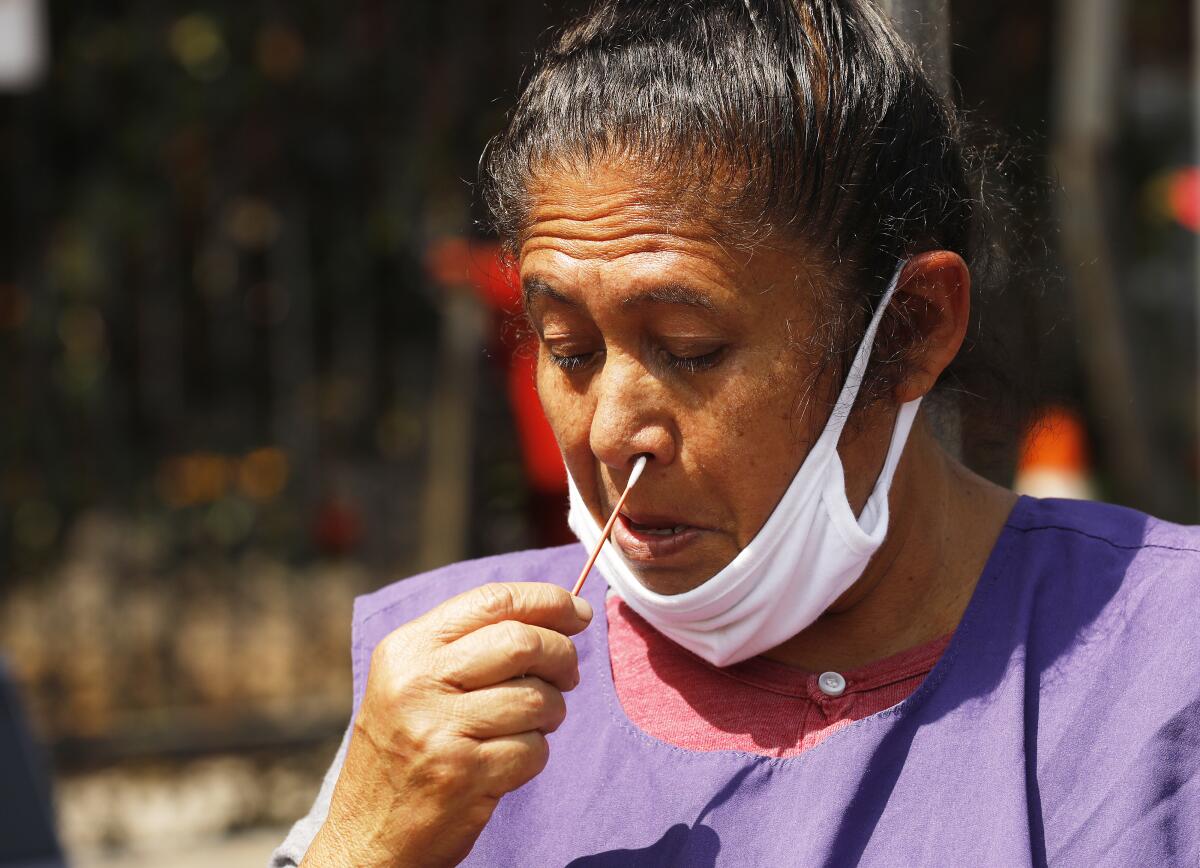
By 1 p.m., Curative had administered around 80 tests and 30 vaccines. Jennifer Pajounia was one of the last people to get vaccinated. Because she had COVID back in October, she questioned the point of getting the shot.
Instead, she decided to wait, “to let things settle down a little.”
“Clearly things aren’t getting better,” she said. “Clearly it’s something that everyone has to do.”
The 27-year-old, who lives at home with her parents and her brother, said her family started to feel sick two weeks ago.
“I thought to myself, I’m tired of being scared and wondering if it’s COVID or not,” she said. “I might as well just get vaccinated to avoid that.”
Times staff writers Luke Money and Rong-Gong Lin contributed to this report.
More to Read
Sign up for Essential California
The most important California stories and recommendations in your inbox every morning.
You may occasionally receive promotional content from the Los Angeles Times.




